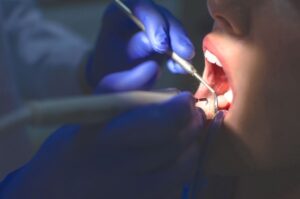Save Your Dental Implants with the LAPIP® Protocol
According to the American Academy of Periodontology, 64.7 million American adults aged 30 or older have periodontitis, the more advanced form of periodontal disease. These are the reported causes, with the potential of millions of undiagnosed cases, periodontal disease can damage the gums and bone structure of the mouth, loosen teeth, and even cause teeth to fall out.
Why Dental Implants Fail
Dental implants are also at risk of damaging teeth and gums. Failing dental implants have become more common since dental implants have been used for replacing a single tooth, replacing several teeth, replacing a full mouth of teeth, sinus augmentations, or even for ridge modifications. No matter what dental implant is performed, if the periodontist performing the dental implant procedure does not check if the gum tissue surrounding the implant is free of bacteria and healthy then dental implant failure is likely.
If the patient is already suffering from periodontal disease (or the more advanced gum disease, periodontitis) the dental implant is also likely to fail due to the likelihood that the gums are already infected with bacteria. The implant fuses to the bone to act and feel like natural teeth. This is why healthy gums are important before having dental implant surgery, because inserting dental implants with unhealthy gums can cause bone loss, postoperative infection, higher risk of dental implant failure, and risk of peri-implantitis. Peri-implantitis is the inflammatory process affecting the soft and hard tissues surrounding the dental implant. The results of this disease is very similar to periodontal disease.
Smoking and bad oral hygiene can also cause dental implants to fail. Even after you’ve been fitted with dental implants, it’s important to see your dentist or periodontist regularly to make sure the implants are performing correctly.
The Risk of Cheap Dental Implants
Cheap dental implants can also cause implant failure, because the dental implant could be made from a less expensive material than, for example, the more commonly used titanium. Even getting cheap dental implants that are made from titanium can be risky. If the periodontist uses a cheaper brand of the implant or if the periodontist hasn’t performed many dental implant procedures, then the dental implants could be more likely to fail. It is important to avoid cheap dental implants because the results can be detrimental to your teeth and remember you only have one set of teeth. As with many things in life: if it sounds too good to be true, it probably is. Ask important questions of your dentist, including how long they’ve been practicing, how many dental implant procedures they’ve performed, their thoughts on whether or not clearing the bacteria from the gums is important, and the type of material their preferred dental implants are made of.
Pain Caused By Failed Dental Implants
Many people ask the same question while considering dental implants: “do dental implants hurt?”
While pain is associated with any kind of surgery, everyone’s body adapts to pain differently. The pain could vary based on the type of implant. Teeth may be removed, gums could be cut, drilling into the jaw, or even a titanium rod could be inserted into your mouth. However, the dental implant pain associated with failing dental implants could be more severe than the initial implants.
As mentioned above, peri-implantitis and bacteria can cause major issues to dental implants that cause pain. Dental implant pain can be caused by swelling or inflammation in the gums, the implant becoming loose and even moving around in the mouth, and by the bacteria spreading around the implant, causing pain.
The LAPIP® Protocol Procedure Can Help
The laser assisted peri-implantitis procedure (LAPIP®) Is designed to save dental implants by preventing the infected tissue surrounding the implant from decaying further. The procedure uses the same PerioLase MVP-7™ laser used to successful LANAP® treatments for periodontal disease to save natural teeth. The assisted laser pinpoints the affected area and eliminates the infected tissue (while not affecting the stimulating tissue), The LAPIP® laser encourages the remaining healthy tissue to naturally spread around the implant and strengthen the bone to enhance support. Results of the LAPIP® protocol have reported little pain with maximum recovery.
The LAPIP® protocol was built to fight harmful oral bacteria head on, helps support natural tissue and bone growth, and prolongs the life of dental implants making them more durable. The long-lasting effects can be life-saving as the risk of pancreatic cancer, stroke, and heart disease are reduced from the procedure.
LANAP® and LAPIP® have been shown by the FDA to actually regenerate osseous tissue and bone, leading to both short-term and long-term health benefits for the patient.
For more information on how LAPIP® can save your dental implants in Arcadia, CA click here. Or call us at (480) 407-6193.




